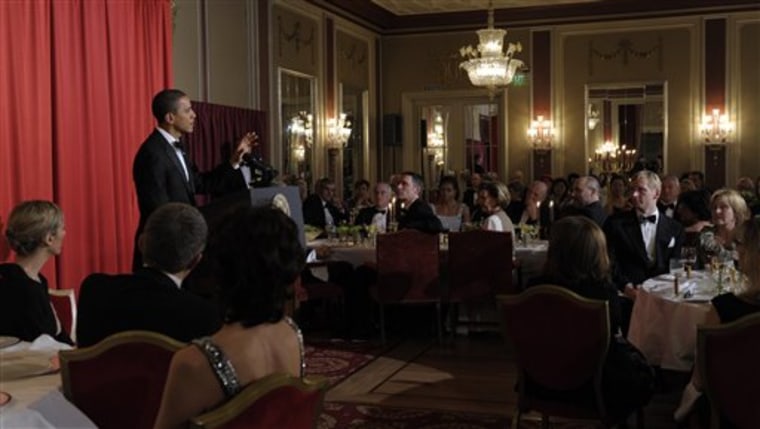Barack Obama split the difference in his Nobel speech, laying down a doctrine that will likely define his presidency: a steadfast defense of warfare against evil mixed with praise of nonviolence and exhortations for mankind to affirm the "spark of the divine" in everyone.
As he accepted the Nobel Peace Prize, the world's highest honor for peacemaking, Obama voiced his starkest rejection yet of the pre-emptive war doctrine and unilateralism articulated by his predecessor.
At the same time, the young president carefully set forth and sought to explain what might appear to be contradictory principles that have guided his foreign policy decisions during his first year in the White House:
- That military force is justified to confront evil or stop organized human depravity.
- That all nations must follow international rules of conduct that govern the use of military force.
- That the United States cannot act alone when going to war.
- That lasting peace is built on united global pressure on errant nations, tough sanctions — when needed — to change the behavior of countries such as Iran and North Korea, recognition of the inherent rights and dignity of every individual, and assurance of mankind's security from fear and economic want.
In a certain sign that he, for once, had not automatically offended the conservative Republican opposition at home, Newt Gingrich, the former House speaker, said the president's message in Oslo "was actually very good."
The deeply conservative Gingrich said the liberal Obama acknowledged he was "given the prize prematurely" but wisely reminded the Nobel committee "they wouldn't be able to have a peace prize, without having force. ... I thought in some ways it's a very historic speech."
Former Alaska Gov. Sarah Palin, the GOP vice presidential nominee last year, also praised Obama's words on the necessity of war.
"Wow, that really sounded familiar," she said in an interview with USA Today. "I talked, too, in my book about the fallen nature of man and why war is necessary at times."
Historian John Baick said Obama had rejected "the need to choose between idealism or realism."
"This speech has got to be the Obama doctrine," said Baick, a professor at Western New England College in Springfield, Mass.
Zbigniew Brzezinski, President Jimmy Carter's national security adviser, said Obama had taken to Oslo a careful restatement and refinement of his "grand re-conceptualization of American foreign policy, a very broadly stated case that we cannot in all circumstances avoid war."
And to that point, Obama spoke clearly:
"I face the world as it is, and cannot stand idle in the face of threats to the American people. For make no mistake: Evil does exist in the world. A nonviolent movement could not have halted Hitler's armies. Negotiations cannot convince al-Qaida's leaders to lay down their arms."
Obama then turned philosopher, apparently satisfied with his defense of the U.S. war in Afghanistan, comfortable he had explained how a Nobel laureate had just days earlier ordered 30,000 more U.S. troops into battle. He became a preacher issuing a sermon calling the world to what he said was the best in people.
"Let us reach for the world that ought to be — that spark of the divine that still stirs within each of our souls," the president said, finally drawing applause. And as he wound down toward a conclusion, Obama sought again to embrace what he saw as the best and worst in the world, looking toward an uneven but hopeful future.
"Clear-eyed, we can understand that there will be war, and still strive for peace. We can do that, for that is the story of human progress; that's the hope of all the world; and at this moment of challenge, that must be our work here on Earth."
A fine message to a hall full of intellectuals in Oslo.
Will it translate in the grimy, shadowy corners of a world where war and terrorism germinate?
